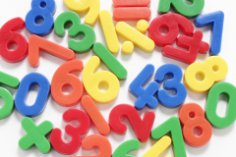
Ancient people, using quantitative assessments of everything around them, noticed the inexplicable influence of certain numbers on various events in their lives. They attributed everything incomprehensible to magic, and this impact of assessment on natural phenomena and on humans themselves became known as the “magic of numbers.” The word “magic” comes from the Greek “mageia” (magic, witchcraft) and was often used by ancient people to define supernatural phenomena and the abilities of individuals (magicians).
Ancient people, noticing the strange influence of certain numbers on events, began to call them magical. Thus, people began to attribute supernatural properties to numbers: some brought good luck and success, others misfortune and the blows of fate. The magic of numbers played an important role in the pre-philosophical consciousness of ancient people, who created myths about the gods, and they reflected it in their works. The ancient Greek farmer Hesiod, in his poem “Works and Days,” described the cycle of agricultural work and indicated which days of the month were favorable and which were unfavorable for various tasks. The number “seven” was especially revered by ancient people.
Since ancient times, seven has been considered lucky, even sacred and divine. It is used in historical events, sayings, proverbs, and maxims. The number seven has been used to represent the greatest human achievements—the “Seven Wonders of the World”—and the wisest men—the “Seven Sages” of Ancient Greece, the “Seven Sages” of Indian mythology, and so on. Among one African tribe, the number seven symbolizes the unity of the whole, summing up the numbers “three” (masculine) and “four” (feminine).
The ancient Greeks represented numbers with the letters of their alphabet, and scholars of the biblical text have discovered that it is permeated with strange numerical patterns: every word encodes the number “seven,” and three Old Testament words, “God, heaven, earth,” represented as numbers, make up the number seven repeated one hundred and eleven times—three sevens (777). The word “Jesus” in Greek, replaced with numbers, is represented by three eights (888), and the word “Satan” by three sixes (666).
Ancient man believed that fate was predetermined by God, and no matter what he did, it was impossible to change it. More than two millennia later, the French writer Balzac, the Russian Tsar Nicholas II, and other famous figures of our time would all share this belief. Honoré de Balzac, just like the ancients, believed that all the misfortunes destined for each person, as well as their nature, were predetermined and calculated. But how could one know how many misfortunes and how many happy days each person was destined for in their life? Curiosity drove people to search for a single, universal law of numbers.
The ancient philosophers and scientists Thales, Anaximander, Heraclitus, and Pythagoras attempted to construct a picture of the world, and some of them advanced opposing theories of the universe. Heraclitus believed the world was like a river, with new waters rolling in upon those who entered it, and that there was no repetition in the world—”everything is transient and disposable.” Pythagoras's worldview, however, embraced the idea of eternal repetition, of all existence existing within some abstract dimension. He developed the theory of numbers and, according to legend, discovered that musical intervals can be expressed as ratios between the numbers 1, 2, 3, and 4. “All things can be represented as numbers,” Pythagoras asserted, implying that they rule the world.
His homeland was the island of Samos in Ionia, Asia Minor, and before opening his philosophical school in a Greek colony in southern Italy, he is said to have visited Egypt, India, and Babylon, where he encountered ancient Eastern wisdom. From the teachings of Pythagoras, one could conclude that numbers combine and have a special effect on humans. According to the ancient Jewish teachings of the Kabbalah, the world was created by numbers and sounds. Ancient Greek philosophers apparently incorporated creation theories and the scientific achievements of other peoples into their teachings.
It is numbers that can predetermine fate, believed the mystic Pythagoras, at the same time giving advice on how to fight hostile magic: “When you put on shoes, start with the right foot,” “When you wash your feet, start with the left,” “Never give in to unbridled joy,” “After getting up from sleep, roll up the bed and smooth out the place where you lay,” “Spit on your cut nails and hair.”
His student Philolaus, who miraculously escaped the burning house in which, according to some philosophers, Pythagoras himself perished, identified the essence of a solid figure in four, quality and color in five, animation in six, intelligence and health in seven, and love and friendship in eight. He believed that the universe was formed from the Limit, the Boundless, and Harmony.
Pythagoras didn't initiate everyone into his teachings, and instead passed on his knowledge orally, so his theory can only be judged from the writings of his students—the Pythagoreans. In their view, numbers completely ruled the world: they were closely linked to geometric shapes, predetermined a person's fate, guided their lives, brought them good fortune or misfortune, and “certain sets of numbers represented justice, the soul, reason, and possibility, and accordingly, everything else could also be expressed in numbers.”
The Pythagoreans developed a doctrine of “properness”: victory over passions, subordination of the younger to the elder, the cult of friendship and camaraderie, and the veneration of Pythagoras. They healed the body with gymnastics, the soul with music, and avoided anger, anxiety, and despondency. Pythagoras's followers believed that the universe was founded on unity, and that numbers were composed of identical units, but the inability to distinguish the physical from the mathematical and the phenomenon of incommensurability destroyed their worldview.
Explore, friends, reflect, and, having comprehended the ancient wisdom, you yourselves will become wise.





